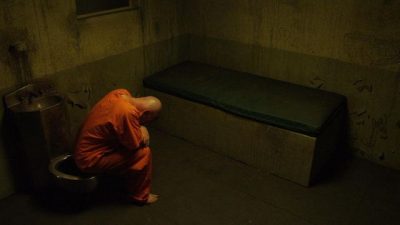Poisoned Land

It is no surprise that many prisons are built on polluted land that has been torn apart for resources, brutally mistreated, and virtually destroyed. The land is dangerous, wrought with toxins and pollutants.
Prisons — places created to lock up and lock down the most marginalized people — are often chosen to inhabit these desolate and poisonous lands.
People who are imprisoned face atrocious environmental conditions on a daily basis, from contaminated drinking water to polluted air. In the midst of a pandemic, the living conditions for our people inside are only deteriorating. As correspondent Cecil Brookins notes, “We’re force-fed cancers, contagions, flus, and coronavirus with no tests or medical treatment.”
Prison Radio has access to the cruel and unlivable environment of prison through commentaries we record, written and spoken by people who are incarcerated, and we need your help to keep those voices on air. These commentaries, embedded with facts, research, and personal stories, are essential in the fight to expose the environmental abuse in prison administrations; by donating to our Winter Campaign now, you can make this impact. Work with us to ensure that the voices we need most are not silenced.
In Pennsylvania, State Correctional Institution (SCI) Fayette is located directly on a coal ash dump. According to the Abolitionist Law Center, 80% of the people imprisoned suffer from the toxic ash, causing a slew of health conditions, from routine headaches to respiratory illnesses. Our people inside have no choice but to sit and watch their health decline.
As correspondent Mumia Abu-Jamal commented on SCI Fayette,
“The culprit here is the wide array of chemicals…The other culprit? The PA Department of Corrections, which chose to build a prison in the midst of a toxic waste dump. In Pennsylvania, every prison sentence can be a death sentence.”
To build a prison on toxic land is extremely negligent to the lives of people who are incarcerated. Yet government officials have another priority: jobs. Since 1992, there have been five federal prisons built in central Appalachia, triggered from the downfall of coal mining, according to The National Resources Defense Council. This is a direct example of the prison industrial complex, as these prisons were not built to “fight crime,” but rather, to re-energize a dying economy.
In order to understand the state of the environmental conditions that people experience in prison, we need first-hand accounts. Our correspondents report the truth, and it is essential to amplify their voices. Donate if you are able, as correspondent Byrant Arroyo makes it clear that it is simply not an option to leave this fight in government hands.
“Pennsylvania Department of Corrections, DOC, knows it has a water crisis on its hands. The top agencies…know about this open secret, and have conspired to ignore most, if not all of prisoners’ official complaints,” Bryant Arroyo said.
*
Note to readers: please click the share buttons above or below. Forward this article to your email lists. Crosspost on your blog site, internet forums. etc.

